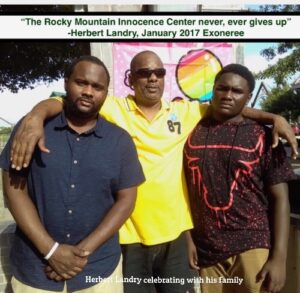Rocky Mountain Innocence Center (RMIC) works to correct and prevent the wrongful conviction of innocent people in Utah, Nevada, and Wyoming.
RMIC is the Innocence Network affiliate covering Utah, Nevada, and Wyoming and is the only nonprofit organization in this region providing pro bono post-conviction innocence investigation and litigation services to those who have been wrongfully convicted.
 RMIC receives approximately 20 requests for assistance each month. Each post-conviction claim of innocence is carefully vetted and screened by RMIC staff and Case Oversight Committee before acceptance. Each accepted case is thoroughly investigated for any evidence of innocence that was unavailable at the time of trial. The investigation of these cases takes anywhere from two years to decades to complete. If new evidence of innocence is discovered the case enters the litigation stage where RMIC and cooperating counsel have the burden of proving factual innocence. A finding of factual innocence expunges the exoneree’s record, entitles the individual to compensation for years of wrongful incarceration (in Utah and Nevada, not yet in Wyoming), and most importantly, reunites the victim of wrongful conviction with their family and friends.
RMIC receives approximately 20 requests for assistance each month. Each post-conviction claim of innocence is carefully vetted and screened by RMIC staff and Case Oversight Committee before acceptance. Each accepted case is thoroughly investigated for any evidence of innocence that was unavailable at the time of trial. The investigation of these cases takes anywhere from two years to decades to complete. If new evidence of innocence is discovered the case enters the litigation stage where RMIC and cooperating counsel have the burden of proving factual innocence. A finding of factual innocence expunges the exoneree’s record, entitles the individual to compensation for years of wrongful incarceration (in Utah and Nevada, not yet in Wyoming), and most importantly, reunites the victim of wrongful conviction with their family and friends.
In addition to providing free legal services to innocent people in prison, RMIC conducts outreach and education to law enforcement, prosecutors, judges, defense attorneys, policymakers, the media, and the public about the causes and consequences of wrongful convictions. Through these educational activities, RMIC advocates for systemic reforms to improve our justice system.
Finally, RMIC works with Utah, Nevada, and Wyoming legislators and other policy advocates to enact legislation to address the causes of wrongful conviction.
Justice System Reform
In addition to providing free legal services to innocent people in prison, RMIC conducts outreach and education to law enforcement, prosecutors, judges, defense attorneys, policymakers, the media, and the public about the causes and consequences of wrongful convictions. Through these educational activities, RMIC advocates for systemic reforms to improve our justice system.
Finally, RMIC works with Utah, Nevada, and Wyoming legislators and other policy advocates to enact legislation to address the causes of wrongful conviction.
Milestones For Our Clients & Legislation

Ashley Bennett was wrongfully convicted of first-degree murder with a gun enhancement and sentenced to life without the possibility of parole.
Read more about Ashley’s story here

Christopher Wickham was wrongfully convicted in 1997 of two counts of aggravated sexual assault in Salt Lake City. He spent approximately 15 years in prison and was placed on the sex offender registry.
Read more about Christopher’s story here

Recording of Interrogations – NRS 171.1239
- Along with the Innocence Project, RMIC consulted on this law that requires law enforcement agencies to adopt detailed, written policies regarding the electronic recording of custodial interrogations that are conducted in a place of detention. This protects both law enforcement and the accused from the possibility of false confessions.
Compensation – NRS 41.900 et seq.
- Working with the Innocence Project, RMIC, with deeply important testimony from our exoneree, DeMarlo Berry, was involved in passing this law allowing a person who was wrongfully convicted to bring an action for compensation, including damages and other relief.
Factual Innocence – NRS Title 3, Section 34.900 et seq.
- Working with the Innocence Project, other collaborators and a working group including the prosecution community, RMIC supported this law which establishes provisions relating to the filing of a petition for a hearing to establish the factual innocence of a person based on newly discovered evidence.

Post-Conviction DNA Testing Statute — Utah Code Ann. §78b-9-300 to 304
- At RMIC’s request, language in the statute prohibiting the court from ordering post-conviction DNA testing when defendant’s attorney failed to request testing at the time of trial for “tactical” reasons was repealed.

DeMarlo Berry was wrongfully convicted in 1995 at the age of 19 for the 1994 Las Vegas murder of Charles Burkes. Mr. Berry always maintained his innocence. Although there was no physical evidence linking Mr. Berry to the crime – no gun, no fingerprints, and no DNA – he was convicted and sentenced to life. He would spend the next 22+ years in prison.
Read more about DeMarlo’s story here

Post-Conviction DNA Testing Statute — Utah Code Ann. §78b-9-300 to 304
- At RMIC’s request, the law was amended to clarify the requirements to obtain post-conviction DNA testing by providing that the new evidence only need establish by a “reasonable probability” that the petitioner would not have been convicted, or would have received a lesser sentence, rather than requiring that the evidence conclusively establish factual innocence.

Post-Conviction Determination of Factual Innocence — Utah Code Ann. §78b-9-400 to 405
- The State again threatened to lobby to repeal this important legislation and RMIC again stepped up to the plate and helped to further clarify the process for establishing factual innocence when DNA evidence does not exist.
Judgment and Assistance Payment — Utah Code Ann. §78b-9-405
- Due to pressure from RMIC and families of exonerees, the statute was again amended to provide that factual innocence claims are not extinguished upon the death of the petitioner and that remaining assistance payments can be made to a surviving spouse if the exoneree dies before the State pays his/her compensation in full.

Harry Miller spent four years in prison for a robbery he did not commit. He was convicted in 2003 of an aggravated robbery at a convenience store.
Read more about Harry’s story here

Deb Brown spent 17 years in prison for a murder she did not commit. She was convicted in 1995 of murdering her friend and employer, Lael Brown, who was found shot to death in his home in Logan, Utah.
Read more about Deb’s story here

Post-Conviction Determination of Factual Innocence — Utah Code Ann. §78b-9-400 to 405
- After the State announced its intention to ask for a repeal of this law, RMIC worked with the Attorney General and the governor’s office to clarify the process for claiming factual innocence.
Judgment and Assistance Payment — Utah Code Ann. §78b-9-405
- The Utah Attorney General’s office amended the statute to provide that both factual innocence claims and assistance payments are extinguished upon the death of the petitioner.

Post-Conviction Testing of Genetic Marker – N.R.S 176.0918
- Existing law provided that a person convicted of a crime and sentenced to death could petition a court to conduct post-conviction DNA testing to prove a credible claim of innocence. RMIC was integral to passing an amendment to the law allowing any person who is convicted of a serious felony and under any sentence of imprisonment, regardless of whether he/she is under a sentence of death, to petition the court for post-conviction DNA testing.
Preservation of Evidence – N.R.S. 176.0912
- As destruction of evidence makes post-conviction DNA testing impossible, RMIC advocated that the NV legislature pass this law providing that when a defendant is convicted of a serious felony, all biological evidence secured in connection with the investigation or prosecution of the defendant must be preserved until the defendant’s sentence expires.

Post-Conviction Determination of Factual Innocence — Utah Code Ann. §78b-9-400 to 405
- In a collaborative effort with the Utah Attorney General’s office, RMIC helped to pass this law that creates a process for individuals to petition a court for a post-conviction determination of factual innocence where DNA is not available.
Judgment and Assistance Payment — Utah Code Ann. §78b-9-405
- In a collaborative effort with the Utah Attorney General’s office, RMIC helped to draft this law that creates a process for an individual to obtain financial assistance (compensation) if he/she is found to be factually innocent.

Post-Conviction DNA Testing Statute — Utah Code Ann. §78b-9-300 to 304
- RMIC consulted on this law that was sponsored by the Statewide Association of Prosecutors creating a process for individuals to petition a court for post-conviction DNA testing.
 RMIC receives approximately 20 requests for assistance each month. Each post-conviction claim of innocence is carefully vetted and screened by RMIC staff and Case Oversight Committee before acceptance. Each accepted case is thoroughly investigated for any evidence of innocence that was unavailable at the time of trial. The investigation of these cases takes anywhere from two years to decades to complete. If new evidence of innocence is discovered the case enters the litigation stage where RMIC and cooperating counsel have the burden of proving factual innocence. A finding of factual innocence expunges the exoneree’s record, entitles the individual to compensation for years of wrongful incarceration (in Utah and Nevada, not yet in Wyoming), and most importantly, reunites the victim of wrongful conviction with their family and friends.
RMIC receives approximately 20 requests for assistance each month. Each post-conviction claim of innocence is carefully vetted and screened by RMIC staff and Case Oversight Committee before acceptance. Each accepted case is thoroughly investigated for any evidence of innocence that was unavailable at the time of trial. The investigation of these cases takes anywhere from two years to decades to complete. If new evidence of innocence is discovered the case enters the litigation stage where RMIC and cooperating counsel have the burden of proving factual innocence. A finding of factual innocence expunges the exoneree’s record, entitles the individual to compensation for years of wrongful incarceration (in Utah and Nevada, not yet in Wyoming), and most importantly, reunites the victim of wrongful conviction with their family and friends.







